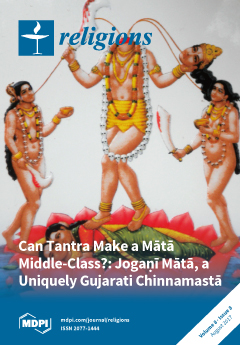Open AccessArticle
Do Religious Struggles Mediate the Association between Day-to-Day Discrimination and Depressive Symptoms?
by
Terrence D. Hill 1,*, C. André Christie-Mizell 2, Preeti Vaghela 3, Krysia N. Mossakowski 4 and Robert J. Johnson 5
1
School of Sociology, The University of Arizona, Social Sciences 400, P.O. Box 210027, Tucson, AZ 85721-0027, USA
2
Department of Sociology, Vanderbilt University, PMB 351811, Nashville, TN 37235-1811, USA
3
Department of Sociology, Florida State University, 600 W. College Avenue, Tallahassee, FL 32306, USA
4
Department of Sociology, University of Hawai’i at Mānoa, 2424 Mailem Way, Saunders 215, Honolulu, HI 96822, USA
5
Department of Sociology, University of Miami, 5202 University Dr., Merrick Building, Rm 120, Coral Gables, FL 33146, USA
Cited by 25 | Viewed by 6576
Abstract
Although numerous studies have shown that discrimination contributes to poorer mental health, the precise mechanisms underlying this association are not well understood. In this paper, we consider the possibility that the association between day-to-day discrimination (being disrespected, insulted, and harassed) and depressive symptoms
[...] Read more.
Although numerous studies have shown that discrimination contributes to poorer mental health, the precise mechanisms underlying this association are not well understood. In this paper, we consider the possibility that the association between day-to-day discrimination (being disrespected, insulted, and harassed) and depressive symptoms is partially mediated by religious struggles (religious doubts and negative religious coping). To test our mediation model, we use data collected from the 2011 Miami-Dade Health Survey (
n = 444) to estimate a series of multiple regression models assessing associations among day-to-day discrimination, religious struggles, and depressive symptoms. We find that day-to-day discrimination is positively associated with religious struggles and depressive symptoms, net of adjustments for general religious involvement, age, gender, race, ethnicity, immigrant status, interview language, education, employment, household income, financial strain, and marital status. We also observe that religious struggles are positively associated with depressive symptoms. Our mediation analyses confirm that day-to-day discrimination can contribute to depressive symptoms by stirring religious struggles. Our key finding is that religious struggles may serve as a maladaptive coping response to discrimination. Our analyses extend previous work by bridging research in the areas of discrimination, religious struggles, and mental health.
Full article
►▼
Show Figures





